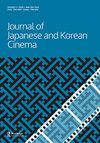韩国“慰安妇”叙事电影的视觉年代政治
引用次数: 0
摘要
摘要:军事“慰安妇”电影超越了同质群体,而是讲述了一种固有的独特人类存在,以构建情感,从而创造集体和政治的公共记忆。在考察韩国“慰安妇”电影的年代政治时,这篇文章超越了线性和同质历史的概念,强调了想象力在从现在的角度唤起历史记忆方面的力量。特别关注《精灵的回家》(2016)、《我会说话》(2017)、《她的故事》(2018)等当代叙事电影及其独特的情节情感和想象策略。本文章由计算机程序翻译,如有差异,请以英文原文为准。
The visual chronopolitics of ‘comfort women’ narrative films in South Korea
ABSTRACT The military ‘comfort women’ films go beyond homogeneous groups, but instead speak to an inherently singular human existence to construct affects that lend themselves in creating a public memory that is both collective and political. In examining the chronopolitics of South Korean ‘comfort women’ films, the essay looks beyond the notion of linear and homogeneous history and underscores the power of imagination in reviving historical memories from the present perspective. Especially, it pays attention to the contemporary narrative films such as Spirits’ Homecoming (2016), I Can Speak (2017), and Herstory (2018) and their distinctive strategies of melodramatic sensibility and imagination.
求助全文
通过发布文献求助,成功后即可免费获取论文全文。
去求助
来源期刊

Journal of Japanese and Korean Cinema
Arts and Humanities-Visual Arts and Performing Arts
CiteScore
0.60
自引率
0.00%
发文量
16
期刊介绍:
Journal of Japanese and Korean Cinema is a fully refereed forum for the dissemination of scholarly work devoted to the cinemas of Japan and Korea and the interactions and relations between them. The increasingly transnational status of Japanese and Korean cinema underlines the need to deepen our understanding of this ever more globalized film-making region. Journal of Japanese and Korean Cinema is a peer-reviewed journal. The peer review process is double blind. Detailed Instructions for Authors can be found here.
 求助内容:
求助内容: 应助结果提醒方式:
应助结果提醒方式:


